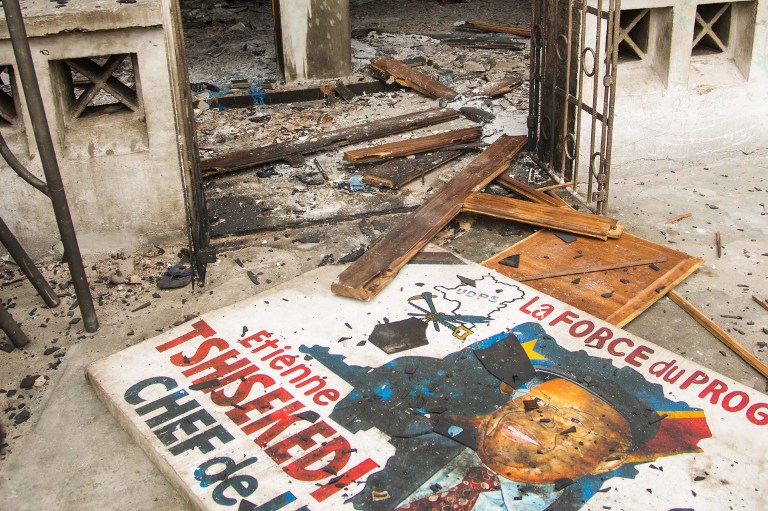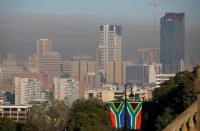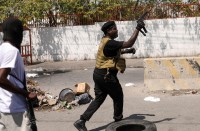
At least two burnt bodies could be seen in the fire-ravaged offices of the UDPS, while two other people were burnt alive and one person injured, they said. The fresh violence came after a bloody day on September 19, 2016 during which opposition groups said more than 50 people had died. Violence of September 19, 2016 started just before an opposition rally by demonstrators who fear Kabila — who has ruled the Democratic Republic of Congo since 2001 — is planning to extend his rule unconstitutionally.
/ AFP PHOTO / JUNIOR D.KANNAH
KINSHASA, DR Congo (AFP) – by Marthe BOSUANDOLE
Several people died in a second day of violence in DR Congo Tuesday, with three opposition HQ buildings torched in fresh clashes between police and opponents of President Joseph Kabila.
The violence came after a bloody day on Monday during which opposition groups said more than 50 people had died in protests calling for Kabila’s resignation.
The national secretary of the main opposition group blamed a “commando” unit from the regime for torching the offices of the opposition.
“Does a normal state respond with reprisals?” said Felix Tshisekedi from the Union for Democracy and Social Progress (UDPS).
“We are facing a rogue state,” he said.
AFP journalists reported hearing tear gas and gunfire on Tuesday morning near the UDPS headquarters.
At least two burnt bodies could be seen in the fire-ravaged building. Two others were burned alive and another injured, AFP journalists said.
Fire was still raging at the UDPS office where a tearful woman in her 40s said that her husband had been there when unidentified assailants attacked the building.
“I’ve just put my husband’s body in the morgue. He was killed in the clashes,” she told AFP.
By early morning, the flames were dying down at the other two opposition buildings — belonging to the Forces of Union and Solidarity (FONUS) and the Lumumbist Progressive Movement (MLP) — in the north of the capital Kinshasa.
A FONUS member said that armed men in civilian clothes arrived at the office in a jeep, sprayed petrol and set the building on fire.
Jose Maria Arnaz, the director of the Joint Office of the United Nations for Human Rights in DR Congo, inspected the UDPS office to “investigate” the fire.
“We are seeing what we can do to reduce the political tensions and bring those responsible for deaths to justice,” he told AFP.
‘I can’t step out’
Diplomatic and security sources as well as residents reported several clashes between the police and youths in the central and southern districts of the teeming city of some 10 million. Several police posts were also attacked.
“Up until now there has been firing in the street,” a resident of the central Kinshasa quarter of Ngiri-Ngiri said in the afternoon. “I any case I can’t step out of the house.”
Monday’s violence started just before an opposition rally by demonstrators who fear Kabila — who has ruled the Democratic Republic of Congo since 2001 — is planning to extend his rule unconstitutionally.
Former colonial ruler Belgium heavily exploited the mineral-rich central African nation’s resources and it has been wracked by unrest since independence in 1960. The country has never known a peaceful transition of power.
The government had put the toll from Monday’s violence at 17 — three policemen and 14 “looters” — but warned it could rise further.
The opposition said that security forces fired live ammunition into protesters and urged supporters to pour onto the streets again to demand Kabila step down when his term expires in December.
It urged people “to keep up without hesitation the demands.”
Human Rights Watch researcher Ida Sawyer said the monitor “received credible reports that security forces shot dead at least 20 people (on Monday) during Kinshasa protests against election delays”.
The clashes were the worst violence in the capital since January 2015 when a police crackdown on another opposition protest left several dozen people dead.
Kabila’s mandate ends on December 20 and although the constitution bans him from running again, he has made no effort to schedule elections, fuelling fears he will attempt to cling on to power.
In May, the Constitutional Court said Kabila could remain in office in a caretaker capacity until an election is held, triggering a wave of angry protests.
France and Belgium have voiced concern over the unrest and urged political forces to organise an election quickly.







